Best protein drink for elderly people
The best protein drink for elderly people and seniors is whey protein.
There are lots of whey protein options for elderly people on the market as well as other protein types that can also work well.
Last updated February 2023
This article contains lots of information on the best protein drink for the elderly. I recommend using the contents table above to help find the specific information about protein and protein drinks you are looking for.
Introduction
Protein is so incredibly important for the older adult population for a numerous reasons including:
- Muscle mass and muscle repair
- Health of skin, nails and hair
- Transportation of blood cells
- Hormone balance
- Enzyme health
- Fluid balance
- Energy balance
The problem is, most older adults don't know just how important protein is, how much protein they should be consuming and what exactly the best protein sources are.
This article will give a comprehensive guide on:
- The best protein drinks for elderly people
- Why protein is so important for the elderly and seniors
- How much protein the elderly and seniors should consume everyday
- How the elderly and seniors can easily measure how much protein they are consuming everyday
IMPORTANT NOTE: There are NO protein drink brands that are marketed specifically to the older adult and elderly population. Do not let that put you off buying them. It's just marketing!
What are the best protein powder drinks that elderly people can buy?
Firstly I'll list products that come as a powder and need to be mixed with either water or milk. The benefits of protein power over pre-made liquid protein drinks include:
- Cheaper
- Easier to store at home
- Easer to mix with other ingredients to make smoothies
Bulk
Bulk is a leading sports nutrition brand. Don't be put off by this fact. Most protein powders are marketed towards athletes and younger gym goers. This protein powder is perfect for adding good quality protein into your diet as an elderly person or older adult.
This Bulk whey protein powder concentrate contains approximately 22 grams of protein per scoop (30 grams serving) and mixes pretty well. It's comes in a wide variety of flavours and from personal experience, it's very tasty.
Price: £21.99 (approx 1kg)
Click the link below to purchase from Amazon.
Bulk Pure Whey Protein Powder Shake, Vanilla, 1 kg, Packaging May Vary
Optimum nutrition
Optimum Nutrition is another best selling protein powder that targets the gym goer market but would be a great protein drink for the elderly and older adults.
This product is a whey protein concentrate containing about 24 grams of protein per serving. It comes in a variety of flavours.
Price: £23.99 (approx 1kg)
Click the link below to purchase from Amazon.
PhD nutrition
This PhD nutrition product is a little cheaper but contain less protein per serving at 17 grams. As a result is has fewer Calories per serving but it's not a huge difference. It has a slightly lower sugar content than other products but don't let that be a deciding factor in your purchase as it's only marginal.
As usual, it's not specifically branded for the elderly but don't let that put you off.
Price: £15.00 (approx 1kg)
Click the link below to purchase from Amazon.
PhD Nutrition Diet Whey Protein Powder, 1 kg, Vanilla Cream
USN
This product packs a whopping 55 grams of protein per serving (3 scoops) but you can do 1 or 2 scoops instead and it will still give you plenty of protein.
It also contain 5 grams of creatine per serving. Creatine is a highly tested supplement that could support cognition as well as muscle/strength retention. It's naturally found in muscle tissue but adding some extra via your diet is very beneficial.
I really like this product and know it mixes well and tastes nice. Lot's of flavours available.
Price: £43.95 (for 4 kilo tub)
What are the best ready made liquid protein drinks to buy?
These products are bought pre-made in liquid form. As a result they're generally a little more expensive but much do offer convenience.
UFIT
This Ufit product is a little more neutrally branded as a nourishment drink. It contains 22 grams of protein per serving as well as a few added vitamins and minerals such as vitamin D, E and C as well as some calcium. (although in relatively small amounts).
It's generally sold as a pack of 8 bottles.
A few of the reviews have alluded to the product curdling after a while in storage but on the whole the reviews are pretty good.
For a more comprehensive review of this product check out this review from Annie Bean
Price: £8.00 (for a pack of 8 bottles)
Click the link below to purchase from Amazon.
Grenade
Ok, so the branding for this product is a far cry from trying to attract the older generation but the fact is they pack a good amount of protein at ~25 grams per bottle and they are a little higher in Calories which is good for elderly people who struggle to eat enough.
They are also extremely tasty and have a really nice consistency.
They are pricer than the Ufit product listed above but they probably are a better product in terms of taste and consistency.
As usual, don't let the branding put you off. They are good product with a good amount of protein.
Price: £15.00 (for a pack of 8 bottles)
Click the link below to purchase from Amazon.
Grenade Carb Killa High Protein Shake Fudge Brownie, 8 x 330 ml
Fuel
This Fuel 10k high protein drink is a more neutrally branded option but does very much the same as all the other products I have mentioned.
It's marketed as a breakfast drink which can be helpful for busy people as getting a quality source of protein in the morning is good.
Of course protein doesn't discriminate based on the time of day you consume it so you could also use this drink in the daytime or evening.
It has 20 grams of protein per carton and is a reasonably priced option. It also comes in 4 flavours.
Price: £8.80 (for a pack of 8 bottles)
Click the link below to purchase from Amazon.
FUEL10K 330ml Vanilla Breakfast Milk Drink - Pack of 8 - High Protein Milkshake
PhD Bars
High protein bars have become increasingly popular in recent years and can make a nice change from liquid forms of protein.
This Phd Smart bar packs 20 grams of quality protein and comes in a variety of tasty flavours.
Price: Currently listed at £16.99 for 12 bars (April 2021). Normal price £19.99.
Click the link below to purchase from Amazon.
PhD Smart Bar, High Protein Low sugar chocolate coated snack (Dark Chocolate Brownie), 12 Bars
If you opt to buy a protein powder then having a good shaker is must. This PhD shaker has a metal mixing ball which helps to break up the powder and gets rid of the lumps.
Purchase this great mix ball protein shaker from Amazon
Don't forget what I said about branding and marketing. There are NO protein supplement products specifically marketed to the older adult demographic but don't worry. Protein is protein and older adults need it more than anyone.
Now you've got some good product recommendations read on and learn everything you need to know about protein for the elderly and older adults.
If you want to buy a high Calorie drink or a meal replacement drink instead of just a high protein drink then you can see my product recommendations here
What is protein?
Protein is 1 of 3 macronutrients that we get energy from. The other 2 are carbohydrates and fat. Energy is the fuel we need to live. It's like the petrol that cars need to drive.
Petrol is a cars energy and Calories are a humans energy.
So humans can get Calories (energy) from these 3 sources. Protein, carbohydrates and fat.
Apart from providing us with energy (Calories) these 3 macronutrients are also essential for lots of other critical bodily processes that are needed for both survival and keeping us healthy.
Protein is essential for a bunch of these processes including:
- Muscle mass and muscle repair
- Health of skin, nails and hair
- Transportation of blood cells
- Hormone balance
- Enzyme health
- Fluid balance
- Energy balance
Where do we get protein from?
Protein comes from food and drink.
Different foods and drinks have different amounts of protein in them and so when trying to consume more protein we can try and opt for higher protein containing foods.
When it comes to buying the best protein drinks for elderly people there are a few marketing tricks that companies employ to try and make their products more attractive.
To help you identify them we need to delve a little deeper into protein.
A single protein molecule is made up of 20 amnio acids. Each amino acid is linked up to form chains and depending on the shape of the chain the protein molecule will have a different role in the body.
I said earlier that protein comes from the food/drink we eat and whilst that's true, some of those 20 amino acids can be produced within the body. 11 of them to be exact. These are known as non essential amino acids. Non essential becasuse they don't technically need to come from food.
The other 9 are known as essential amino acids because we need to get them from food.
Of those 9, there are 3 that standout because of their unique structure. These are called branched chain amino acids.
If protein is so important for elderly people then why isn't it more known about and advertised more?
It's tough to answer this question.
There's likely to be a host of reasons as to why protein amount, quality and importance is not really mainstream knowledge.
However, the Wise Fitness Academy is trying to change that!
The current social paradigm pretty much accepts that elderly people will become more and more frail and will eventually require care.
What the paradigm doesn't do is empower older adults to slow that process down dramatically using the appropriate methods.
Humans aren't perfect. Lot's of people still smoke despite knowing how harmful it is to health. Just because an idea or advice isn't necessarily mainstream, it doesn't mean that advice isn't extremely important.
The science is unequivocal when it comes to protein quantity and quality for older adults and seniors. Be one of the few to heed the advice and reap the benefits.
Is there a best protein drink for elderly people?
The short answer is no. Not specifically for the elderly when compared to other age groups.
And that's because protein is protein. You cannot get some special formula of protein drink that is necessarily better for the elderly or older adults. A protein drink that's good for elderly people will be equally as good for younger people.
You can however, get protein drinks and different foods that differ in overall protein quality and that's what we'll go through later in this article.
Interestingly, the protein drink market is heavily geared towards the younger generations.
If you search for a protein drink supplement the vast majority are marketed towards young gym goers who want to get muscly.
As far as I can tell, the closest any protein drink or powder gets to being specifically marketed for the elderly is a neutrally branded one. So basically, there is NO protein drink supplement specifically marketed to older adults.
And this might just be causing a big problem.
Because it just might be that elderly people and older adults will be put off buying a protein drink that has a young muscly guy or girl on the label.
And this is a big problem because it's the elderly and older adults that need these protein drinks far more than younger people.
You may be here reading this because your Dr or a personal trainer or someone has told you to increase your protein intake. But is that common knowledge among most elderly people? I'd be willing to be that it's not.
Very few elderly people regularly use protein supplementation when they absolutely should be.
Younger generations use protein drinks to aid in muscle gain. Typically it's younger gym goers who buy and consume protein shakes because they understand the importance of protein for muscles.
Whilst they could get their protein from regular food sources, it's just far more convenient to include protein drinks in the diet in order to get enough protein. Because you need quite a bit of protein to really aid muscle gain.
And that's exactly why elderly people should use protein drinks. Because just like young gym goers need more protein to grow muscles, elderly people need more protein to preserve and grow muscles.
Let's talk about why protein drinks are so important for the elderly and older adults in the next section.
Why is protein so important for the elderly and older adults?
A second ago I said that the elderly population need more protein in order to preserve and grow muscle mass (and strength). They need more than their younger counterparts.
As humans age, the body undergoes numerous physiological changes. Lot's of the internal systems start to slow down and become less efficient.
This slowing down seems to be the case when it comes to the absorption and processing of protein. Studies strongly suggest that the elderly have a blunted response to muscle protein synthesis and therefore need more protein per serving in order to overcome this blunted response.
In order to fully understand this, let's unpack it a little further.
In order for our muscles to adapt and grow (or at least be preserved) we must put our bodies into a state of what's called muscle protein synthesis.
As I have already talked about, one of the key roles of protein is to help grow muscles. Amino acids are the building blocks of muscles.
All 20 amino acids in enough quantity need to be present for muscle protein synthesis to occur.
Remember we talked earlier about the branch chain amino acids? Well they make up 3 of the 9 essential amino acids that we must get from food. One of those 3 branched chain amino acids is called leucine. Leucine is the primary driver when it comes to muscle protein synthesis. It basically kick starts the entire muscle building process.
Further studies have shown that the elderly need more leucine within their protein intake than their younger counterparts in order to kickstart muscle protein synthesis.
It's this blunted response to protein that makes the quantity and quality of protein intake so important for the elderly and older adults.
A serving of protein that is low in leucine is probably far less effective at stimulating that all important muscle protein synthesis.
Without having the right quantity and quality of protein there is a far higher risk of what's called muscle protein breakdown which essentially means loss of muscle mass.
This loss of muscle mass results in loss of strength, mobility and eventually loss of independence.
Loss of lean mass (muscle mass) also negatively effects metabolic and other crucial health markers.
What do we mean by protein quality?
It's important to briefly discuss protein "quality"
Protein quality simply refers to the amount of amino acids present in the food or drink you are consuming.
Now the best protein drink for elderly people will include good quality protein (I.E - it will include all 20 amino acids). But what about other foods that we are eating as part of our diet?
For example all meat products contain all 20 amino acids making it a source of high quality protein.
The same goes for dairy products.
However, the same cannot be said for plant based foods. Most plant based foods only contain a certain amount of the amino acids. They may only contain 12 of the 20 amino acids needed to make 1 complete protein molecule. Some more and some less.
For that reason, those who don't eat meat or dairy as part of their diet need to pay closer attention to ensuring they get a good amount of quality protein into their diet.
Vegans for example need to eat a bigger array foods to ensure that they are getting all 20 amino acids needed for muscle growth and repair.
As a nutritionist, the modern day extreme narratives regarding diet are very frustrating. Lot's of my new clients will come to me and talk about how they've become a vegan for better health.
Eating lots of plant based foods is great, but totally eliminating other food groups can very easily lead to deficiency.
A really simple and effective way for elderly people to get good quality protein into their diet is by drinking milk. Most of us have milk in the fridge at any given time and it's generally part of peoples regular shopping list.
Introducing a glass of milk as part of your breakfast routine is a great way to boost your consumption of quality protein.
Another irk of mine is the rise of plant based milks as a "healthier" alternative cows milk. Plant based milks cannot be compared to cows milk. They are totally different and mostly have a much lower nutrient profile.
Cows milk is a rich source of quality protein and nutrients and cannot be substituted by plant based milks.
So protein "quality" refers to foods that contain all 20 amino acids. Luckily, the vast majority of protein drinks and powders you can purchase will contain all 20 amino acids and are therefore considered a quality source of protein.
What foods contain protein?
Whilst protein drink supplements are incredibly convenient they are what they are. A supplement. You should still strive to eat protein rich foods as part of your regular diet.
It can be really useful to know which "everyday" foods offer up a good amount of protein.
- Eggs
- Mixed nuts
- Beef jerky
- Milk
- Cheese
- Greek yogurt
- Whole grains
- Oats
- Lean meat
- Fish
These are just a few food options that offer a decent amount of good quality protein.
Take a look at this interesting chart below that shows what food groups are largely contributing to peoples protein intake.
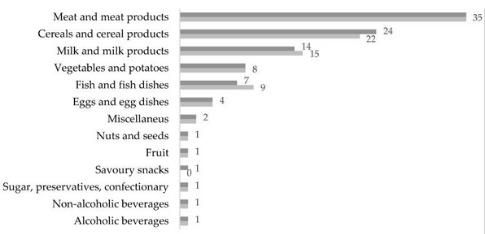
You can clearly see why becoming a vegan could be very problematic in terms of how much protein you're getting into your diet.
How much protein should elderly people have per day?
It's all very well stating that the elderly and older adults need more protein but just how much do you need?
The international guidelines for daily protein intake is set at 0.8 grams per KG of bodyweight but this has been under scrutiny from nutrition scientists for sometime now.
Put simply, it's just not enough. Especially for the elderly who require more protein in general because of the blunted response to muscle protein synthesis we talked about earlier.
The thing is, that guideline of 0.8 grams per KG of bodyweight is set to ensure most of the population aren't deficient in protein.
We want to do much better than just being "not deficient".
We want to thrive. We want to maintain optimal health. We want to maintain muscle mass and strength.
Ideally you should aim to get anywhere between 1.6 - 2.0 grams of protein per KG of bodyweight.
CAVEAT: Whilst the scientific literature repeatedly demonstrates that a high protein diet will not damage your kidneys, anyone with kidney disease or other ailments that limits the function of the kidneys should consult with their physician/doctor before actively increasing protein in their diet.
Another factor is supported by the scientific literature is the fact that older adults and elderly people often have a less than optimal protein distribution across the day. Often, the bulk of protein intake happens in the evening.
It's very important for protein to be consumed throughout the day, and that means the morning as well. This snippet is taken from the Sigma Nutrition website:
"In addition, elderly people often have a skewed distribution of their daily protein intake, with low amounts consumed at breakfast and lunch, with the majority of their daily protein intake consumed at dinner (see Figure 2). This is sub-optimal for the support of skeletal muscle health and function. Therefore it would be a good practice to supplement these lower protein meals with a protein supplement, a practice which is supported by the scientific literature" (Norton et al, 2o16)
What does 1.6-2.0 grams of protein per KG of bodyweight look like in relation to actual food?
Great question.
Lets pretend you weigh 70kg's and are going to aim for 1.8 grams (per kg of bodyweight) of protein per day. Simply multiply 70 by 1.8 which equals 126. So your daily target will be ~126 grams of protein.
Below you can see the grams of protein in some higher protein foods we have already mentioned.
Interestingly very few people actually consume an optimal amount of daily protein. And this refers to all age groups. Even my younger clients are usually surprised when they first track their protein intake and discover how far off it is from their new target.
Most of the clients who first join the Wise Fitness Academy are falling well short before stepping up their protein intake under our guidance.
I introduce protein drinks to most of my Academy clients to help them with their protein intake.
How often should elderly people and older adults use protein drinks?
When it comes to protein intake timing, there are some significant strategies that you can employ to make your protein intake even more effective for muscle gain and retention.
I've already talked about the ideal amount of protein you should be consuming everyday but WHEN you consume it is also important.
For example having the majority of your daily protein in 1 sitting is not optimal.
The research suggests that protein feedings should be spread out across the day into 3-5 separate feedings, and that each feeding should include around 25-40 grams of protein.
This can be done in lots of different ways.
You may choose to have your normal breakfast, lunch and dinner making sure each meal has a good source of protein included in it and then have 2 protein supplement drinks outside of mealtimes.
This is a common approach among the Wise Fitness Academy clients.
For those of you who only want to have 1 protein drink per day it might be optimal to have it before you go to sleep.
Based on the results of this study it is hypothesised that having a protein drink before bed will increase total daily protein and therefore could help reduce loss of muscle mass in the elderly. When combined with exercise it could also improve muscle protein balance which ultimately would lead to a decrease is muscle breakdown.
The amount of protein drinks you should/could have everyday will also depend on how much protein you are getting from other more common food sources in your regular diet.
For example if you typically eat lean meat everyday along with some dairy and whole grains it's likely that your protein intake is a lot higher when compared to someone who follows a vegan diet.
There is no right or wrong answer to this question but a protein drink can be used to help anyone bring their total daily intake up to optimal amounts. If that means having 3 protein drinks per day that's OK.
It's also important that protein drinks are included as part of an otherwise nutritious diet. They cannot be used as an alternative for other nutrients besides protein.
How can you measure how much protein you're having everyday?
There are a couple of ways of getting an idea of how many grams of protein you eat everyday.
It's important to realise it will be a dynamic figure in that not everyday is the same. Some days you might have significantly more protein than others.
Lets take a quick look at how you can measure your protein intake:
- Read food labels and tally up across the day
All packaged food products have a nutrition label which details the amount of macro (protein, carbs fat) and micronutrients (vitamins and minerals) contained within them.
To get an idea of your daily protein intake simply make a note of the amount of protein contained in the foods you eat throughout the day.
For example if you start the day with a bowl of cereal have a look at the nutrition label on the box.
Below is the nutrition label for a box of Kelloggs Cornflakes.
You can see that for a single portion (which in this case is deemed 40 grams) there is 4 grams of protein.
Different products will vary in what is deemed as a "portion" or "serving" but most cereals are between 30 - 40 grams.
Most products will give separate figures for the "serving" amount but all products will give the figure for "per 100 grams"
It can seem a little arduous doing this at first but you only need to do it for a few days to get a good idea of your average daily protein intake.
- Use an App
The wonders of technology allows you to do this using an app. There are several apps available for tracking food but the most popular is one called MyFitnssPal.
You can simply download the app onto your phone and scan the products barcode using your phones camera.
In the video below I demonstrate how to use the MyFitnessPal app to log your food intake.
What's the difference between protein powder drinks and pre-made protein drinks?
The are some key differences to be aware of when it comes to protein powder drinks and pre-made bottled protein drinks but ultimately it's important to understand they are essentially the same thing.
The differences between them might make it seem as though they are different but in reality they're not.
Let's take a look at some of the key differences:
- Branding
Branding is probably the biggest reason why the elderly might get confused about which protein drink is best.
Protein powder is largely marketed at young gym goers who want to get muscly.
Some pre-made bottled protein drinks also market their products to young gym goers but others are more neutral in their marketing which can be more appealing to the elderly and older adults.
When it comes down to it however, they are largely very similar when it comes to nutrition value.
- Price/convenience
Not surprisingly the pre-made bottled protein drinks are more expensive. Protein powder is a far far cheaper option but it does mean you will have to make your own protein shakes.
To be honest, I've been using protein powder for over 10 years to make protein shakes and the process is very easy.
You either simply add milk or water and shake it up in a container or instead use an electric blender. Both options work very well.
- Other nutrients (besides protein)
Typically the pre-made bottled version of protein drinks will often contain other nutrients and therefore be branded as a "nutrient" drink rather than a "protein" drink.
Protein powder tends to just be protein.
It's really up to you what you go for but don't be put off the fact that protein powders aren't generally marketed at the elderly population.
At the end of the day, it's still just protein and the elderly and older adults need protein more than most other age groups.
- Ability to mix other ingredients
With the protein powder you can mix other ingredients into it assuming you have a blender. Adding fruit to your protein shake can turn it into more of a nutritional drink as well as having all the good protein as well.
What's the difference between whey protein and plant based protein drinks
Whey protein is a by-product of making cheese. During the cheese making process curds and whey are separated out and the whey is simply process into a powder.
Plant based protein drinks are used using plant based foods. They are mostly processed in such a way that they offer a full amino acid profile meaning they are a "quality" protein.
If you're a vegan then go with a plant based protein such as soy or pea. However for anyone else I would choose a whey protein.
Whey protein is much smoother and generally contains a better ratio of amino acids. Plant based protein drinks are often very grainy.
What is the best tasting protein drinks for seniors?
I get asked this question a lot.
Of course it is subjective as to what the best tasting protein drink is however there are some things that do change the texture and consistency of protein shakes.
As I mentioned in the last section, whey protein is generally much tastier than vegan/plant based options. Whey protein is very creamy and smooth whilst plant based proteins are generally grainy and more watery.
There's also varying types of whey protein to look out for.
The 2 main types of whey protein are whey concentrate and whey isolate.
The concentrate variety usually contains around 80-90% protein content whilst isolate is up there at 95% plus.
There's not a whole lot of difference between the two but concentrate is generally a bit cheaper and mixes a little better than isolate. Either choice is fine.
Finding a tasty plant based protein is a harder. Stick to better known brands and read the reviews to see what other people have said about it.
Other than that, it's a case of trial and error.
Personally, I mostly use whey concentrate vanilla flavour as it works well with smoothies.
Protein drinks for weight loss
Higher protein diets are strongly associated with successful and long term weight loss.
There are several reasons for this.
Firstly protein is very satiating (keeps you feeling fuller for longer) than both carbs and fats.
Secondly, protein has a very high thermic effect of feeding. This means it requires quite a few Calories to digest it. More than carbs and fat.
If you were to eat 100 Calories worth of protein, ~20 of those Calories would be burned off just through digestion.
This study took 54 obese and overweight older women in good health and assigned them to either
-A diet with higher carb intake and resistance exercise
-A diet with high protein intake and resistance exercise
-No diet and resistance exercise.
The higher protein + resistance exercise group experienced greater loss in body weight, fat mass, percent body fat, and waist circumference. They also had better regulation of blood glucose.
It's worth noting that all participants saw improvements in a number of health, fitness, and functional capacity related variables. This highlights the importance and effectiviness of resistance training for older adults.
How to understand the branding/packaging better
Just like most products, protein powers and drinks are often branded with all sorts of bold claims and "special ingredients".
As personal trainer I've had SO many clients come to me asking about what it all means. It can be very confusing.
Take a look at the tub of protein below. It's plastered with all sorts of extra information.
-"premium high protein"
-"Low Calorie"
-"Healthy metabolism support"
It goes on and on.
It's classic marketing so try not to pay too much attention to it. ALL whey protein products offer "quality" protein. All the claims listed on the packaging are just there to make it more attractive as a product.
If you do want to ask me about a specific product you've come across or been recommended feel free to get in touch with me and I'd happy to take a look.
Conclusion
I will conclude this article on the best protein drink for elderly people and older adults with a summary of key points:
- Protein is an essential part of our diet
- We need to get essential amino acids from food (and drinks)
- Protein is needed for many key roles in our body including muscle growth and preservation
- Protein intake should ideally be spread out across the day with 3-5 servings and each serving would ideally include 25-30 grams quality protein
- Protein quality simply refers to the source of protein containing all 20 amino acids. Meat and dairy are quality sources of protein whereas most plant proteins are incomplete.
- Supplement protein powders and drinks are heavily marketed towards the younger generation and specifically gym goers, however that should NOT deter elderly and older adults from purchasing and consuming them.
best protein drink for elderly FAQ
This is a common misnomer among younger female gym goers. You absolutely will not get "bulky" from just drinking protein shakes. Growing or preserving muscle mass is very hard.
Protein does contain Calories. 1 gram of protein has about 4 Calories. A single scoop of protein shake contains about 25 grams of protein which is around 100 Calories.
Ultimately if you're consuming more Calories than you expend then you will gain weight.
Not to my knowledge.
They are either marketed towards young gym goers or are neutrally branded.
Don't let this put you off. Protein is protein and is required at ALL ages. Particularly the elderly and older adults.
Protein is a macronutrient and not a micronutrient so you can't ingest toxic doses like could with vitamins or minerals.
If you have too many protein drinks you'll likely just gain weight (but only if you're in a Calorie surplus)
No this is not recommended.
Protein shakes should used as part of an otherwise nutritious diet.
You can buy other drink options that offer more nutrients than just protein but it's still advised that the bulk of your diet comes from nutrient dense "real" foods.
This is a common myth regarding protein intake.
Studies have shown safety in protein uptake up to 4 grams per kg of body weight.
This Examine article breaks down the ideal protein requirements for older adults:
So how much protein should you get?
- Sedentary but healthy seniors: 1.0–1.2 g/kg (0.45–0.54 g/lb)
- Sick or injured seniors: 1.2–1.5 g/kg (0.54–0.68 g/lb)
- Seniors wishing to lose weight: 1.5–2.2 g/kg (0.68–1.00 g/lb)
- Seniors wishing to build muscle: 1.7–2.0 g/kg (0.77–0.91 g/lb)












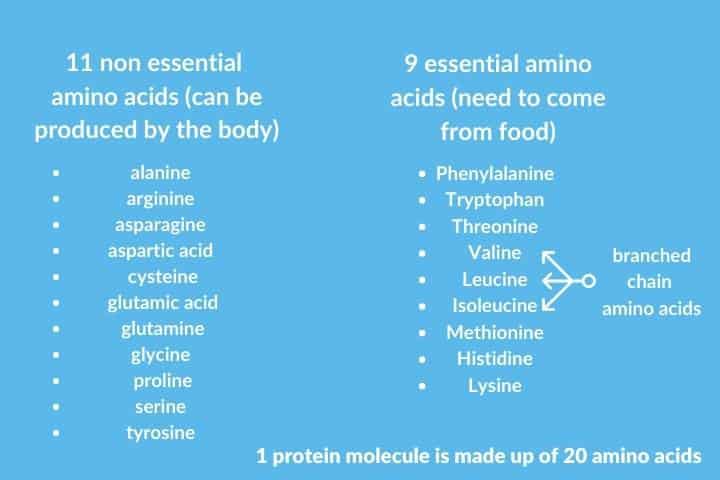
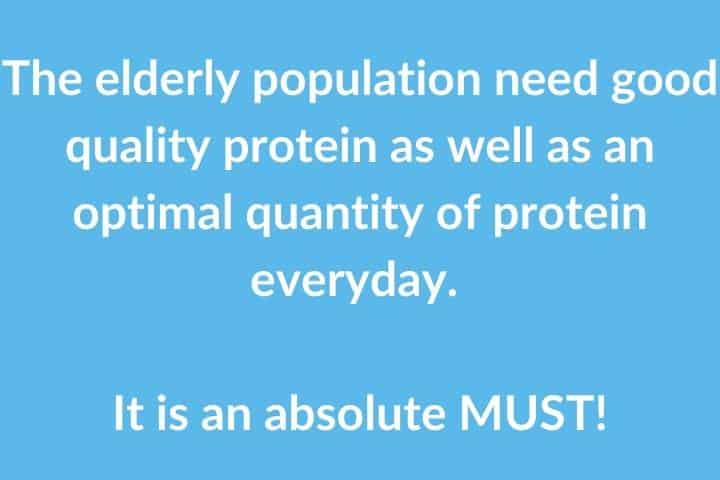
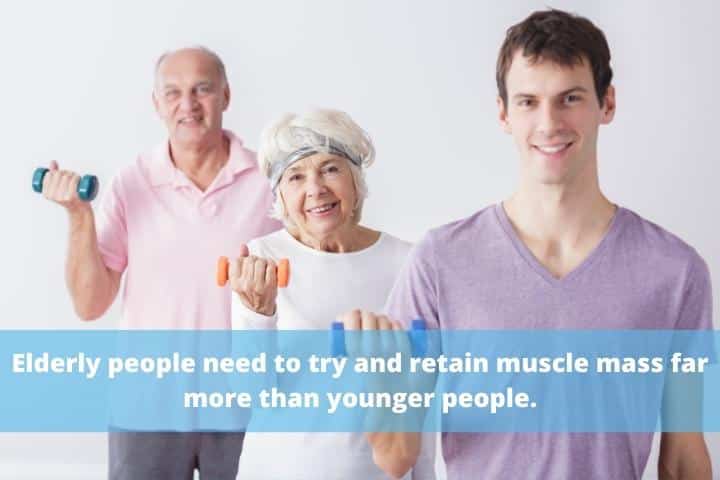
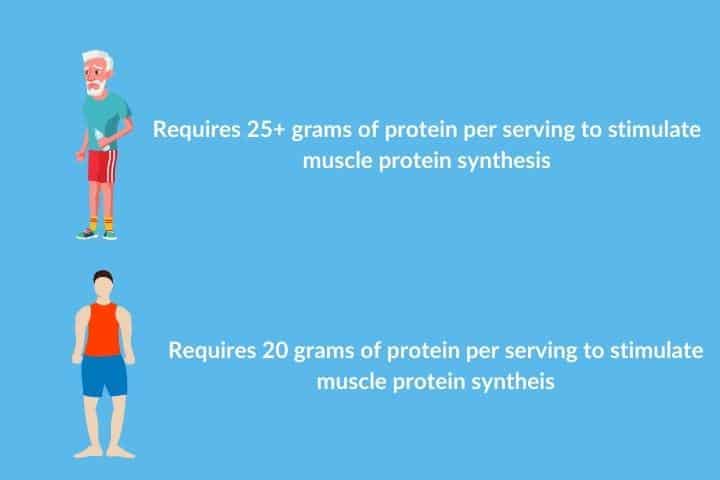
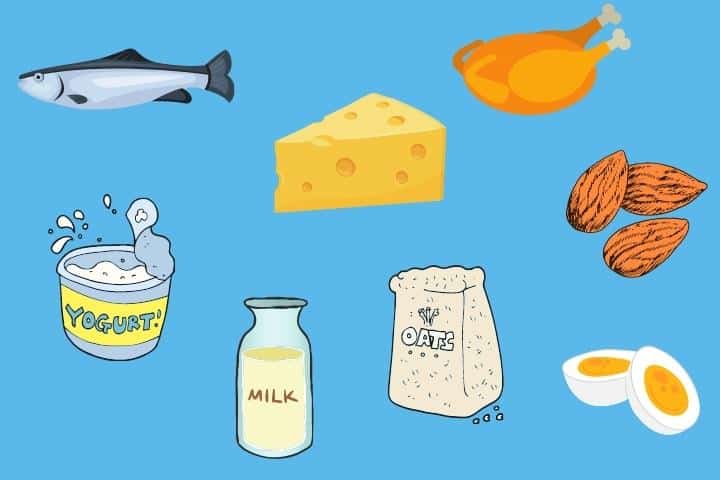

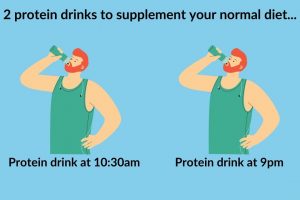
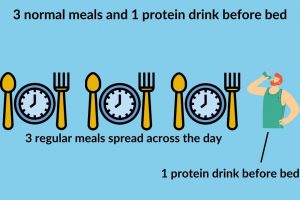
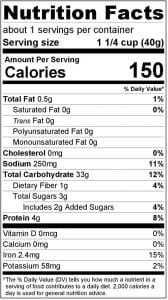

[…] Anyone who has read my other articles will have probably seen me talk about just how important protein is. You can read my article about protein and great high protein products by clicking HERE. […]
[…] You can check out my recommended protein powder products here. […]
[…] Protein intake really is critically important, and again, it's unbelievable that so few people really understand just how important it is. I have written a comprehensive article of protein which you can read by clicking here. […]